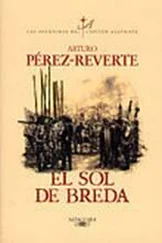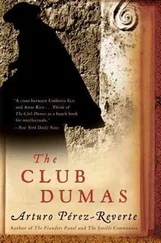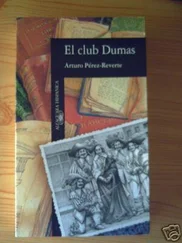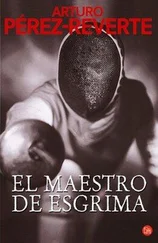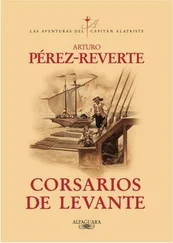I slept wrapped in my blanket, untroubled by the cockroaches and lice scampering over me, for they were hardly a novelty after my experiences on our long voyage on the Jesús Nazareno . Any ship or vessel is home to gallant legions of rats, bedbugs, fleas, and all manner of creeping things who were quite capable of eating a cabin boy alive and who observed neither Fridays nor Lent. And whenever I woke to scratch myself, I would see close by me Diego Alatriste’s wide eyes, as pale as if they were made of the same light as the moon moving slowly above our heads and above the masts. I thought of his joke about galley slaves being discharged from Purgatory.
The truth is I’d never heard him give a reason why he had asked Captain Bragado for us to be discharged after the Breda campaign, and I couldn’t get a word out of him either then or afterward; however, I sensed that I might have had something to do with the decision. Only years later did I learn that, at one point, Alatriste had considered the possibility, one among many, of traveling with me to the Indies. As I have told you before, the captain had, in his fashion, looked after me ever since my father’s death in battle at Jülich in the year 1621, and had apparently now reached the conclusion that, after my experience with the army in Flanders, useful for a lad born into that particular period and with my particular talents—as long as I did not leave behind me there health, life, and conscience—it was time to prepare for my education and my future by returning to Spain. Alatriste did not believe that a career as soldier was the best choice for the son of his friend Lope Balboa, although I proved him wrong about that, when—after Nördlingen, the defense of Fuenterrabía, and the wars of Portugal and Catalonia—I was made ensign at Rocroi and, after leading a company of two hundred men, was appointed lieutenant of the Royal Mail and, later, captain of the Spanish guard of King Philip IV.
However, such a record only shows how right Diego Alatriste was, for although I fought honorably on many a battlefield, like the good Catholic, Spaniard, and Basque that I am, I gained but little reward, and what advantages and promotions I was given were due less to the military life itself and more to the favor of the king, to my relationship with Angélica de Alquézar, and to the good fortune that has always accompanied me. For Spain, rarely a mother and more often a wicked stepmother, always pays very little for the blood of those who spill it in her service, and others with more merit than I were left to rot in the anterooms of indifferent functionaries, in homes for the old and frail, or in convents, just as they had been abandoned to their fate in many a battle and left to rot in the trenches. I was the exception in enjoying good fortune, for in Alatriste’s and my profession, the normal end to a life spent watching bullets rain down on armor was this: Broken, scarred and crippled,
Carrying, if you’re lucky, a letter,
To present at the door of hospitals
Where no one ever gets better.
Not even asking for a reward, a benefice, the captaincy of a company, or even bread for your children, but merely a little charity for having lost your arm in Lepanto, in Flanders, or in Hell itself, and, instead, seeing the door slammed shut in your face with the words: So you served His Majesty
And lost your arm?
Bad luck, we say!
But why, pray, should we pay
For Flanders’ harm?
And then, of course, Captain Alatriste was growing older. Not old in years, you understand, for at the time—the end of the first quarter of the century—he must have been a little over forty. I mean that he had grown old inside, as was the case with other men like him, who had been fighting for the true religion ever since they were boys, receiving nothing in exchange but scars, travails, and misfortunes. The Breda campaign, in which Alatriste had placed some hopes for himself and for me, had proved hard and unrewarding, with unfair officers, cruel commanders, much sacrifice, and little benefit, and we were all as poor as when we had started two years before, apart from what we had managed to ransack from Oudkerk and from other pillaging expeditions, and not counting the discharge pay—my master’s, that is, for we servants were unpaid—which, in the form of a few silver escudos, would at least allow us to survive for a few months. Despite all this, the captain would go on to fight again, when life obliged us to serve once more under the Spanish flag, until I saw him die as I had seen him live: standing, his hair and mustache now grizzled, sword in hand, his eyes calm and indifferent, at the Battle of Rocroi, on the day when the best infantry in the world allowed themselves to be defeated merely in order to remain faithful to their king, and to their own legend and glory. And thus, exactly as I had always known him, in good times, of which there were few, and in bad, of which there were many, Captain Alatriste died true to himself and to his own silences. Like a soldier.
But let us not anticipate stories or events. Long before that, as I was saying, something was already dying inside the man who was then my master. Something indefinable, but of which I first became truly aware on the voyage that brought us back from Flanders. For all my youthful lucidity, however, I still did not quite understand what that something was, and could only watch as a part of Diego Alatriste slowly died. Later, I decided it was a kind of faith, or the remnants of a faith, perhaps a faith in the human condition, or in what heretical unbelievers call fate and what decent men call God. Or perhaps it was the painful certainty that our poor Spain, and Alatriste with her, was sliding down into a bottomless pit, with no hope of anyone getting her or us out of it, not for a long time, not for centuries. And I still wonder if my presence at his side, my youth, and the adoring way I looked at him—for I worshipped him then—did not force him to maintain his composure, a composure that, in other circumstances, might have drowned like mosquitoes in wine, in those mugs of wine of which he occasionally drank far too many, or might else have found resolution in the black, definitive barrel of his pistol.
2. A MATTER REQUIRING SWORDS
“There’ll be some killing involved,” warned don Francisco de Quevedo. “Possibly a lot.”
“I only have two hands,” responded Alatriste.
“Four,” I said.
The captain kept his eyes trained on his mug of wine. Don Francisco adjusted his spectacles on his nose and studied my face for a moment before turning to a man seated at another table at the far end of the room in a discreet corner of the inn. He had been there when we arrived, and our friend the poet had referred to him as Master Olmedilla, with no further introduction or explanation, except that, later, he added the word “accountant”: the accountant Olmedilla. He was a small, thin man, bald and very pale. He appeared timid and mouselike, despite his black clothes and the little curled mustache that set off a short, sparse beard. He had ink-stained fingers and the look of a pettifogging lawyer or a government official who lives by candlelight, surrounded by files and papers. He gave a prudent nod to the silent question Don Francisco was asking him.
“There are two parts to the task,” Quevedo told the captain. “The first will involve you helping that gentleman over there carry out certain, shall we say, negotiations,” and he indicated the little man, who remained entirely impassive beneath our scrutiny. “For the second part, you can recruit as many men as you think necessary.”
“They’ll require some payment in advance.”
“God will provide.”
Читать дальше
